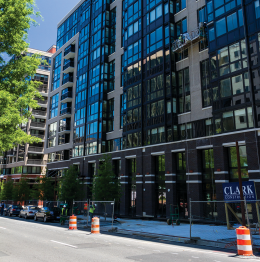
The JBG Companies’ Slate apartment building in Rosslyn, Va., is rumored to be under consideration for graduate student housing.
The university is looking at several options for graduate student housing, potentially for fall 2013.
Georgetown does not currently provide housing for graduate students. In November 2012, however, the university issued a request for information on metro-area options.
The Washington Business Journal reported that the JBGCompanies’ Slate apartment building in Rosslyn is being considered. The building, located at 1530 Clarendon Blvd., is currently under construction and contains 203 units. That location, a 10-minute drive from the university, is also near the Georgetown University Transportation Shuttle stop near the Rosslyn metro station.
JBG Senior Vice President Matthew Blocher and university Vice President for Planning and Facilities Management Robin Morey both declined to comment on any possibility of partnership.
According to Morey, the committee is looking into five or six locations in Rosslyn, Arlington and Washington, D.C., all of which would be leased rather than purchased. These locations were all chosen due to their Metro access and relative proximity to the university. The university will provide a shuttle system to whichever location is chosen.
“Really, it’s proximity, and then secondary is what we can charge for it,” Morey said.
Morey declined to comment on pricing for graduate students, adding that it would be dependent on the price of the lease.
Graduate student housing would likely follow the same guidelines and restrictions governing undergraduate student housing, requiring students of the same gender to live together. Provisions would be made for married couples, while unmarried couples would likely not be permitted to live together, according to Graduate Student Organization President Paul Musgrave (GRD ’16). There is uncertainty about how university policy would treat same-sex marriages or civil unions not recognized by the Catholic Church or if same-sex couples would have access to housing benefits provided to other married couples. Musgrave said he would support equal treatment.
These discussions coincide with undergraduate discussion of gender-neutral housing on campus, an issue highlighted by Georgetown University Student Association President Nate Tisa (SFS ’14) during his campaign.
Musgrave emphasized the importance of housing options to the graduate student community.
“We’ve been advocating for this for a long time. Lacking graduate student housing has put Georgetown at a disadvantage,” Musgrave said. “Especially for people moving in from far away, the D.C. real estate market is really tough to navigate for an outsider. Having housing available is an amenity that many students look for.”
The Office of Student Affairs has solicited graduate student input through a survey covering amenities, price range and housing options, while the university has also utilized graduate student focus groups for input.
“Our goal is to provide housing that meets our students’ needs and further supports their learning experience while enrolled at Georgetown,” university spokeswoman Rachel Pugh said.
Musgrave said that the university asked graduate students about preferences between dormitories and apartments, studio apartments and multi-bedroom apartments, and price points and provisions for married students. The question of gender-neutral housing was not addressed.
Graduate students prioritized differentiating between the housing needs of undergraduates and graduate students in these discussions, pushing for apartment-style housing over shared townhouses or higher-quality dorms.
“There’s a difference from being 18 to 19 and being told that you’re living [in poor conditions] for a year or being 25 or 30 and trying to find the sort of housing that’s appropriate to your needs,” Musgrave said. “Having access to safe, reliable housing is a high priority for many young adults in the D.C. area.”














